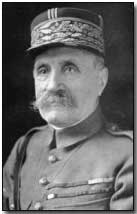Who's Who - Ferdinand Foch
 Ferdinand Foch (1851-1929) was born on
2 October 1851 in Tarbes, the son of a civil servant. He resolved to
become a soldier early in life, joining the army in 1871 where he served in
the Franco-Prussian war of 1870-71.
Ferdinand Foch (1851-1929) was born on
2 October 1851 in Tarbes, the son of a civil servant. He resolved to
become a soldier early in life, joining the army in 1871 where he served in
the Franco-Prussian war of 1870-71.
Having enrolled at the French army college, Ecole de Guerre, Foch proved so impressive that he was asked to remain as a teacher. His lectures there were published as The Principles of War and De la Conduite de la Guerre. Foch further served at the Ecole de Guerre from 1907-1911 as director.
With the onset of war Foch was given command of the Ninth Army during the Battle of the Marne following crucial early successes in Nancy; at the Marne he led the French counter-attack. He was subsequently promoted and given command of the Northern Army on the Western Front in October 1914. In this position he saw service during the Somme offensive in 1916 (and for which he was sacrificed as a French scapegoat, banished for a while to the Italian front).
With the arrival of the hero of Verdun, General Philippe Petain, replacing Robert Nivelle, Foch was recalled from relative obscurity and made Chief of the General Staff in 1918.
Following intense persuasion and negotiation from Georges Clemenceau, the French prime minister, Foch was given overall control of the Allied forces in March 1918, serving as Allied Supreme Commander, in which role he frequently conflicted with Pershing over the disposition of U.S. forces.
Foch stopped the advance of the German forces during the great push of Spring 1918 at the Second Battle of Marne in July 1918, mounting the counter-attack that turned the tide of the war. Foch accepted the German surrender in November 1918. Earlier this year, in July, Foch was made Marshal of France.
Following the conclusion of the war Foch played a major advisory role at the Paris Peace Conference.
Ferdinand Foch died in Paris on 20 March 1929.
Feature: Unjustly Accused: Marshal Ferdinand Foch and the French 'Cult of the Offensive'
Click here to read Pershing's official reaction to news of Foch's appointment as supreme commander. Click here to read Foch's address of 4 July 1918 detailing his confidence at Allied prospects for victory. Click here to read Foch's final telegram to Allied Army Commanders-in-Chief, dated 9 November 1918, in which he urged co-ordinated action to achieve a complete military victory.
"Eggs-a-cook" were boiled eggs sold by Arab street vendors. It was later used by Anzac soldiers when going over the top.
- Did you know?
